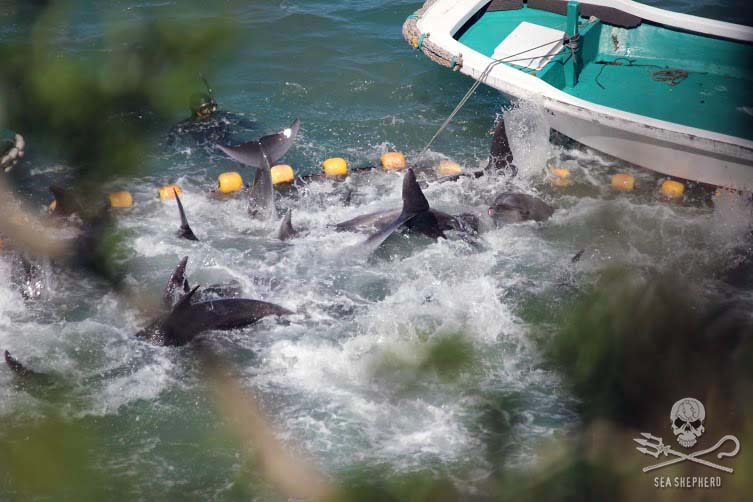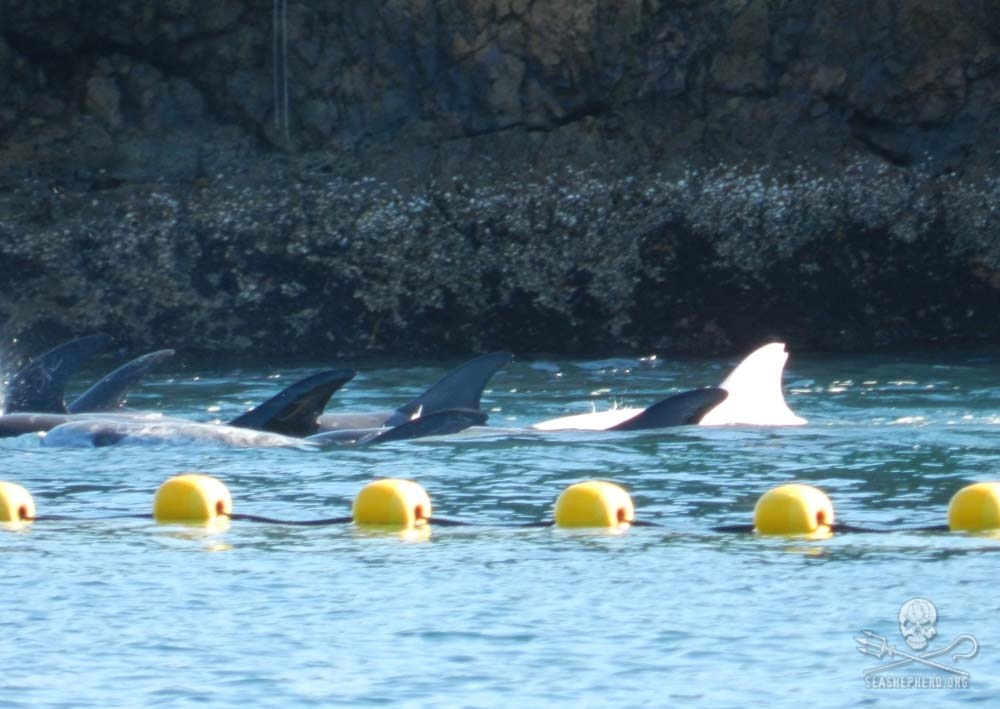Marine Life & Conservation
A Special Report From Sea Shepherd’s Operation Henkaku

 The 2015-2016 Taiji dolphin drive hunt is over. This season, the government of Wakayama Prefecture, Japan, authorized Taiji’s dolphin killers to capture or slaughter up to 1,873 dolphins. In some of the lowest numbers observed in recent years, between 630 and 650 dolphins were ruthlessly driven into the cove and slaughtered. Another 117 were taken captive, destined to spend the rest of their lives in shallow tanks, cement pools, or cramped sea pens performing circus tricks for paying tourists.
The 2015-2016 Taiji dolphin drive hunt is over. This season, the government of Wakayama Prefecture, Japan, authorized Taiji’s dolphin killers to capture or slaughter up to 1,873 dolphins. In some of the lowest numbers observed in recent years, between 630 and 650 dolphins were ruthlessly driven into the cove and slaughtered. Another 117 were taken captive, destined to spend the rest of their lives in shallow tanks, cement pools, or cramped sea pens performing circus tricks for paying tourists.
Sea Shepherd’s dedicated team of volunteer Cove Guardians was on the ground every single day of the hunt. Livestreaming the capture, selection, and slaughter, the Cove Guardians continued to bring international attention to this outrageous crime against the oceans. Despite ridiculous claims by those involved, the Taiji dolphin drive hunt is not tradition; it is a profit-driven enterprise supported by the Japanese government and fueled by the lucrative worldwide trade in captive dolphins.
Although several Cove Guardian veterans were barred entry into Japan, Sea Shepherd’s Cove Guardians stood their ground, as they have since 2010, to make sure the world sees exactly what Taiji tries to hide. The dolphin killers continued to use tarps to try to hide the killing from Sea Shepherd’s cameras, but tarps can’t hide the blood that turns the water from blue to red or the sounds of the frenzied dolphins as they face their executioners. Sea Shepherd’s livestream footage irrefutably dismissed any and all claims of a “humane slaughter.” During one slaughter, a pilot whale escaped from beneath the tarps after being pithed with a metal rod. For several minutes, the profusely bleeding and suffering animal attempted to swim away, eventually slipping under the surface of the water.
Each drive brought new horrific sights and each month was marked by even more merciless acts of violence on the part of the killers.
The annual hunt began on September 1, 2015. The first drive of the season ended with a pod of Risso’s dolphins netted into the cove on September 11. During the ensuing slaughter, the Cove Guardians observed one dolphin trying to escape by launching out of the water and up onto the jagged rocks in the killing cove. As some of the killers dragged the doomed dolphin back into the cove, others looked on and laughed at the plight of the terrified animal.
Following the slaughter of another pod of Risso’s dolphins on October 19, 2015, the killers dumped several bodies at sea. Sea Shepherd believe they took this extreme measure to avoid exceeding their annual Risso’s dolphin-killing quota. The next day, the Cove Guardians discovered the remains of a dead juvenile Risso’s dolphin washed-up on the beach.
November 19, 2015, began four days of anguish as approximately 69 – 74 pilot whales were captured and held in the cove. By November 22, 46 members of this intergenerational family had been slaughtered, and several more succumbed from the sheer stress of the drive and ensuing selection ordeal. One pilot whale was taken captive but died days later in a Taiji harbor sea pen.
December 2015 saw a pod of bottlenose dolphins captured and held in the cove for three days. Bottlenose is the dolphin species most prized by the captive industry. With the assistance of trainers, 30 animals were taken captive. Those dolphins not deemed to be “pretty” enough for captivity were slaughtered while the same trainers laughed and watched.
January always seems to be an especially bloody month in Taiji. This year was no exception.The killers hunted on 22 days and slaughtered pods on 14 of those days. Forty percent of the entire 2015-2016 killing quota was met in January 2016. Nine drives took place in February 2016, with 20 more bottlenose dolphins taken captive and forced into the tiny sea pens in Taiji harbor.
The 105 bottlenose dolphins, seven Risso’s dolphins, one pilot whale, and four Pacific white-sided dolphins taken into captivity during the 2015-16 Taiji dolphin hunt are now condemned to a dismal “life” as slaves to the captive industry. Forced to perform circus tricks in order to receive a reward of drug-laced frozen fish, many of these animals will die prematurely from stress, trauma or both.
The Taiji dolphin killers repeatedly claim that the dolphin drive hunt is their “tradition.” They also blame the dolphins for decreasing fish stocks and say that the drive hunt is a form of “pest control.” At the same time, they proclaim the pods of dolphins and whales who migrate through the waters of Taiji to be their property. In reality, the desire to hunt and capture dolphins has nothing to do with pest control or tradition. It has everything to do with greed. Captive dolphins are a multi-million-dollar worldwide industry that starts in Taiji, Japan.
The Taiji dolphin killers are profiting from a demand for captive dolphins. If you proudly display a photo kissing a captive dolphin, if you support marine parks and dolphinariums, you might as well stand alongside the killers in Taiji’s bloody cove. Your entrance fee to these places fuels the tanks for another hunt.
After five campaigns of Operation Infinite Patience, this season’s Operation Henkaku sought to focus specific attention on the captive trade. Taiji is all about supply and demand. The hunting and slaughter of dolphins will not end for good until the demand for captive dolphins ends for good.
While the grueling 2015 -2016 Taiji dolphin drive hunt season has now ended, the pressure on those who hold dolphins captive must not! Let’s close down the killing cove for good by bankrupting the worldwide captive trade. Dolphins are not assets, commodities or property. They don’t belong on transport trucks or cargo planes, and they certainly don’t belong in tanks. We must all continue to be a voice for the dolphins. Sea Shepherd have called on everyone who followed Operation Henkaku to keep pressuring travel agents, hotels, cruise lines, marine parks, and dolphinariums to stop profiting from the misery of captivity.
Tell everyone you know to “Just say NO to the dolphin show!”
For more information, visit Sea Shepherd’s Operation Henkaku site here.
Marine Life & Conservation
Paul Watson Released as Denmark Blocks Japan’s Extradition Bid

Renowned anti-whaling activist Paul Watson has been released from custody in Greenland after spending five months in detention. Denmark’s Justice Ministry rejected Japan’s request for his extradition, citing insufficient guarantees that his time already served in custody would be credited against any potential sentence.
The 74-year-old Canadian-American was arrested on July 21 in Nuuk, Greenland’s capital, when his ship docked to refuel. His arrest was based on a 2012 Japanese warrant related to a 2010 encounter in Antarctic waters. Japan alleged Watson obstructed operations and caused damage to a whaling research ship during efforts to disrupt illegal whaling. Watson has consistently denied these claims, maintaining his commitment to marine conservation.
Denmark, which oversees extradition matters for Greenland, concluded that while the legal conditions for extradition were met, the lack of assurances from Japan regarding time-served credit made extradition untenable.
In a video shared by his foundation, Watson expressed gratitude and relief, saying, “After five months, it’s good to be out… and good to know they’re not sending me to Japan.” He added that the most difficult part of his time in custody was being separated from his two young sons.
Watson is a pioneering figure in marine conservation, known for founding the Captain Paul Watson Foundation in 2022 after decades of activism with the Sea Shepherd Conservation Society. His bold efforts to defend marine life have earned him widespread support, including from celebrities and conservationists. His work has also been featured in the acclaimed reality TV series Whale Wars.
Watson’s lawyer, Jonas Christoffersen, praised the decision, stating, “We are happy and relieved that Paul Watson is now free.” He added that Watson is eager to reunite with his family and continue his vital work.
The arrest occurred while Watson’s vessel, the M/Y John Paul DeJoria, was en route to the North Pacific with a team of 26 volunteers to intercept a Japanese whaling ship. His foundation described the arrest as politically motivated and emphasized that Watson’s actions were focused on ending illegal whaling practices.
Japan resumed commercial whaling in 2019 after leaving the International Whaling Commission, asserting that whale meat is a cultural tradition. Conservationists, however, continue to challenge these practices, highlighting their impact on marine ecosystems.
Despite the challenges, Watson remains steadfast in his mission to protect marine life and bring attention to whaling practices. His dedication to ocean conservation has made him a globally respected advocate for the environment.
Marine Life & Conservation
12 Days of Zero-Waste Fish-mas

This holiday period, the Marine Conservation Society, the UK’s leading ocean membership charity, invites you to make some simple changes to eating fish this Christmas to help our seas.
Dr Kenneth Bodles, Head of Fisheries and Aquaculture at the Marine Conservation Society, said, “During the festive season, our consumption increases, but so does waste. Sustainability isn’t just about where food comes from – it’s also about how you use it. By reducing waste and making the most out of your seafood, you’re not only taking steps to be more ocean-friendly, but can also help to cut costs during what is often one of the most expensive times of the year”.
The Marine Conservation Society has compiled twelve tips on how to consume seafood sustainably with zero-waste this Christmas:
Buy whole fish instead of fillets
Instead of fillets, consider buying whole fish such as salmon, hake, or lemon sole. By adopting a “nose to tail” approach with cooking, whole-baked fish not only feeds a crowd, but also helps to minimise waste and maximise sustainability by using up every part of the animal, including bones, skin, and fat.
Make fish stock
Leftover fish bones or shells can be put to good use by boiling them to make a nourishing fish stock or bisque. This can be frozen and preserved for later use and makes for a flavourful base in a soup.
Make your own fish pâté
Avoid waste by turning leftover fish, such as smoked mackerel or salmon, into a delicious pâté by blending with cream cheese and lemon. Perfect when paired with crackers.
The sustainability of salmon and mackerel varies depending on where and how it is caught or farmed. For more information on green-rated options, check the charity’s Good Fish Guide.
Buy frozen
By purchasing seafood that is frozen or vacuum-packed, this helps to reduce waste by extending the shelf life of your food.
Fish pie
If you’re wondering what to do with leftover cooked fish, why not opt for a classic fish pie with mashed potatoes, leeks, and a cheesy sauce? A sure crowd pleaser on Boxing Day.
Use the head
Don’t forget the fish head! The meat is incredibly tender and flavourful. The charity recommends a cod’s head curry or recreating Fallow’s renowned cod’s head in siracha butter.
By stretching your ingredients further, not only is this a more sustainable way to enjoy seafood, but also cost-effective by repurposing leftovers and cooking creatively.
Boxing Day brunch
Mix leftover kippers or smoked salmon with scrambled eggs for a tasty, zero-waste, Boxing Day brunch.
For best choice, make sure you buy kippers, or herring, from the North Sea and the North Irish Sea.
Zero-waste storage
A top tip from the Marine Conservation Society to avoid waste is freezing fish offcuts to save for future use.
Crisp up the skin
Even leftover fish skin can be turned into a quick savoury snack by crisping it up in an air fryer with a little olive oil and salt.
Anchovies two ways
Leftover anchovies can either be blended with butter to make a delicious anchovy butter or tossed into pasta for a hit of umami flavour.
The charity recommends opting for anchovies caught in the Bay of Biscay for best choice.
Fishcakes
For an easy, zero-waste meal, leftover seafood trimmings can be mixed with mash and fried in breadcrumbs to make fishcakes.
Pickled mussels
Try pickling mussels in 1:1 vinegar and water, with a dash of sugar for a sustainable, zero-waste snack that can be enjoyed well beyond the festive season.
Mussels farmed in the UK are a seafood superhero. Grown using low-impact methods and harvested by hand, they get all the food they need from the sea around them. This makes them one of the most sustainable, ocean-friendly, and cost-effective seafood options.
Players of People’s Postcode Lottery have raised £6.6M towards the Marine Conservation Society’s vital work in making seafood more sustainable.
Laura Chow, Head of Charities at People’s Postcode Lottery, said: “Fish is a festive favourite for many, but making sustainable choices when it comes to how we buy and eat seafood makes all the difference for our ocean. Support from players of People’s Postcode Lottery has helped the Marine Conservation Society further its sustainable seafood work, so that we can all enjoy healthier, better protected seas.”
The Marine Conservation Society encourages you to make sustainable seafood choices a year-round habit, not just for Christmas. To check how sustainable the seafood on your plate is, you can visit the charity’s Good Fish Guide. The Guide helps consumers and businesses identify the most sustainable seafood using a simple traffic light system, based on where and how species are caught or farmed. Green is the best choice, amber means improvements are needed, and red indicates fish to avoid buying.
Zero-waste gift idea
Why not embrace a zero-waste Christmas by gifting a membership to support marine conservation? It’s a meaningful, low-waste gift that helps protect our ocean for generations to come. Memberships start from as little as £5 a month – the price of a sandwich and drink from your local coffee shop.
Find the latest sustainable seafood advice for wild-caught and farmed seafood on the Good Fish Guide, downloadable to your phone from www.mcsuk.org/goodfishguide.
-

 News2 months ago
News2 months agoIconic SS United States to become the World’s Largest Artificial Reef
-

 News3 months ago
News3 months agoBook Review – 52 Assignments: Underwater Photography
-

 Gear News3 months ago
Gear News3 months agoDYNAMICNORD – New German diving brand enters the British market
-

 News3 months ago
News3 months agoExploring Cenote El Pit: A Diver’s Dream
-

 Gear News3 months ago
Gear News3 months agoTry BARE drysuits (and maybe even win one!) this Friday with Sea & Sea at North West Dive Fest
-

 Marine Life & Conservation3 months ago
Marine Life & Conservation3 months agoBook Review: Coral Triangle Cameos
-

 Blogs2 months ago
Blogs2 months agoDive the Egyptian Red Sea this Autumn with Regaldive
-

 News3 months ago
News3 months ago2024 Ocean Art Underwater Photo Competition Announced





